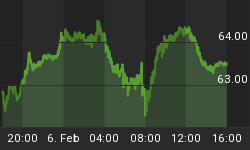The good news is:
• The recent soft patch for the market appears to have endedlast week.
• Many of the indicators reached their lowest levels since therally began last March offering a nicely defined long side entry point.
Major market declines begin with a build up of new lows and end with a peak in new lows.
Minor market declines begin with a build up of downside volume and end with a peak in downside volume.
The chart below shows a 4% trend of NASDAQ downside volume on an inverted Y axis (Increasing downside volume pushes the indicator downward). Downside volume began building after the first of the year and, although it is too early to be sure, peaked last Wednesday at the highest level since the rally began nearly a year ago. New lows peaked at 13 on the NYSE Thursday and 11 on the NASDAQ Monday so there is no hint that the recent soft patch was anything but a short term correction.

The next chart shows momentum of new lows subtracted from momentum of new highs. New highs and new lows for this chart are calculated over the trailing 6 weeks (rather than 52 weeks as reported by the exchanges). Only the component issues of the Russell 2000 were used for the calculation of this indicator. Turning points anywhere near the level we saw last week provided good short term entry points.

It is not just the small caps offering an entry point. The chart below shows the S&P 500 (SPX) along with a volume indicator calculated from volume of the component issues of the SPX. The indicator is momentum of the ratio of (upside volume / (upside volume + downside volume). The indicator bottomed last week at its lowest level since this rally began.

As of last weekend most of the indicators were at or near their lowest lows since this rally began and still heading downward. During the past week most of the indicators turned upward.
Not everything is perfect. The NASDAQ new high indicator (a 10% trend of NASDAQ new highs) is still heading downward. As you can see in the chart below this indicator has done a pretty good job of smoothing out the wiggles. The actual current value of the indicator is 190 so any number of NASDAQ new highs above 190 will turn the indicator upward.
Coming off oversold levels with no longer term negatives leads me to expect the major indices will be higher at the close Friday February 13 (superstitions aside) than they were at the close Friday February 6.
Last week, of the major indices, only the NASDAQ composite was down and only by 1/10%, so I am calling last weeks positive forecast my first win for the year.















